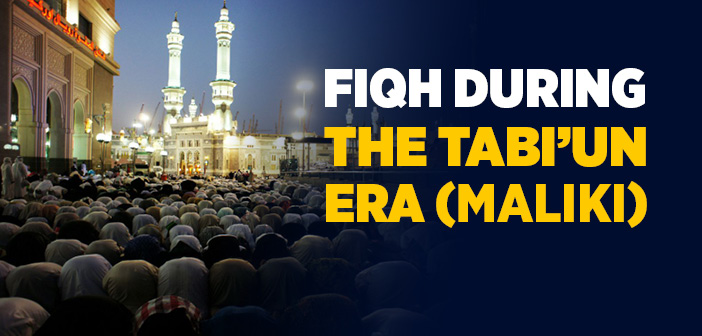What is fiqh maliki? How was fiqh during the era of the tabi’un?
The generation who came right after the Sahaba and had the chance to see them are called tabi’un. This era begins with the end of the Khulafa al-rashidin era and continues until the final years of the Umayyad dynasty (first quarter of 2nd hijri century).
During this tabi’un era, teachings of the Companions had been recognized and followed. The tabi’un fuqaha had learnt their knowledge from the Ashab, and would consult the Qur’an and Sunnah. When no ruling was found in the Qur’an and Sunnah, they would perform ijtihad according to the ‘illah of the case.
The following are some of the most notable fuqaha who lived in this era:
In Kufa; Alqama, Masruk, Qadi Shurayh, Ibrahim an-Nakhai, Shabi, Hammad b. Abi Sulayman, Ibn Abi Layla. In Madinah; Said b. El Musayyab, Qasim b. Muhammad, Nafi Zuhri, Rabi’atur-ra’y. In Makka; Mujahid, Ikrima, Ata b. Abi Rabah etc.
The following are the characteristics of this era in terms of fiqh are:
1- The expansion of the Islamic borders, increase of issues and questions, lead to the arisal of various political groups and opinions.
2- The spread of false (mawdu’) ahadith among the people lead to the establishment of the system for hadith analysis.
3- Written texts about fiqh were produced in this era: Different opinions arised and the study of fiqh expanded with the growth of the Islamic population and geography.
4- Schools of ahl ra’y and ahl hadith were formed: Here is some more information about these schools:
Ahl ra’y (Kufa school) : Kufa; a city on the gulf of Basra, was a city that gained fame with the expansion during the time of the Khulafa al-rashidin. Caliph Ali (r.a) turned it into the capital city during his rule. One of the most notable Companions of the Prophet had settled and taught in this city; Abdullah b. Mas’ud. He is considered to have transferred the fiqh of Omar (r.a) to Kufa, which lead to the rise of later notable scholars such as Alqama, Ibrahim an-Nakhai, Hammad b. Abi Sulayman and subsequently Imam Abu Hanifa.
Kufa was a multi-cultural and progressing city. There was a need for ijtihad due to the variety of arising issues and problems. Among the newly converted Muslim population, the effects of their previous religions were still present, thus weak and fabricated narrations were being spread among the people. Thus, this problematic manifestation lead to the rise of great Islamic scholars (fuqaha).
Ahl ra’y jurists reject assertions that contradict with the basic Islamic principles, and they focused on using common sense and logic to scrutinize matters.
Ahl hadith (Hijaz/Madinah school): Most of the learned Companions of the Prophet chose to remain in Makka and Madinah and guide the people with their fiqh knowledge. Abdullah b. Abbas and Abdullah b. Omar were significant religious figures in this geography. Great scholars of this school such as Imam Malik, Imam Shafi’i and Imam Ahmad b. Hanbal were students of scholars of the very same school (ahl hadith) such as Zuhri, Nafi, Rabiaturra’y etc.
The most important characteristic of the ahl hadith school based in Madina was their “athar” specialty. Athar is the ahadith of the Prophet, and opinions of the Sahaba and Tabi’un.
Ra’y did not gain much popularity in the city of Madinah which wasn’t affected much by outsiders. Due to the large collection of ahadith, ahl hadith jurists had given more value to revelation than common sense.
Source: Fiqh1 (According To The Maliki School Of Islamic Law), Erkam Publications





